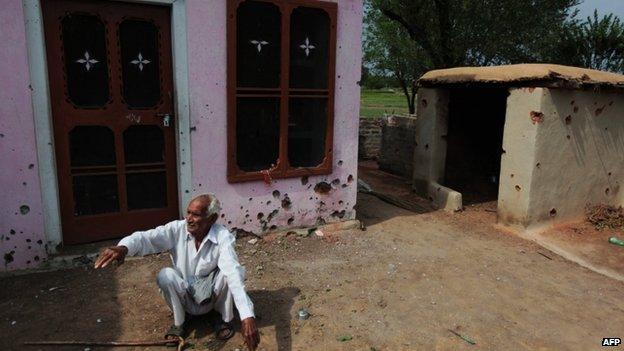Indian media: Kashmir border clashes
- Published

Civilians have suffered on both sides of the border
Media are backing India's "strong" response to Pakistan on border clashes, while urging the government to have a "long-term" strategy on the issue.
Both India and Pakistan have accused each other of starting the exchange of fire on the border in the disputed region of Kashmir.
India said eight civilians died after Pakistani troops fired shells into Indian-administered Kashmir; Pakistan said 11 civilians were killed in Pakistan-administered Kashmir in firing by Indian troops.
Indian papers have given front-page coverage to what they call India's "strong response" to Pakistan.
The Pioneer, external reports that the Indian government has given a "free hand" to its troops and that they are prepared for the "long haul".
A front-page story in the Deccan Herald, external reports that India has "resorted to massive firepower to silence Pakistani guns from across the border".
India will not negotiate for an end to the clashes "till shelling stops from across the border", the paper quotes Indian officials as saying.
The paper, in an editorial, external, says that "in the coming days, if Pakistani soldiers continue to violate the ceasefire agreement, they will be met with even stronger retaliation".
Hindi paper Dainik Jagran, external echoes this view, saying that India must "make it clear that Pakistan's uncivilised behaviour will not be tolerated".
'Start dialogue'
However, some newspapers feel India needs a long-term strategy to deal with the neighbouring country.
An article in the Hindustan Times, external welcomes what it sees as a "befitting response to Pakistan", but goes on to ask: "What is the strategy behind such a demonstration of strength?"
"What is needed is a sober yet firm response by a united India. That alone will defeat the Pakistani strategy of targeting civilians to unleash public outrage on our side to make Delhi abandon restraint," the article advises.
The Times of India, external says "it's all very well for Delhi to talk tough… but it needs a long-term strategy to deal with the situation… No such plan has been forthcoming".
Delhi needs to "open direct channels of communication with the Pakistani army" because it plays an important role in shaping Pakistan's foreign policy, the paper adds.
Meanwhile, The Hindu, external cautions that the clashes may lead to the collapse of a ceasefire that has held since 2003, even though the two countries have often accused each other of violating it.
"There is imminent danger of regressing to the bad old days… when the two sides used to exchange artillery fire daily, causing casualties among both uniformed personnel and civilians," it says.
The paper adds that "both sides need to restart the dialogue process urgently, instead of routinely pronouncing the willingness to do so without taking the necessary steps forward".
Aspiring teachers 'fail'
Moving on to other news, a team of conservationists is trying to salvage priceless historical artefacts damaged in the recent floods in Indian-administered Kashmir, a report in The Times of India, external says.
Officials at the 116-year-old Shri Pratap Singh Museum say their collection of 6th-Century manuscripts, antique shawls and other objects are now "irretrievable". But conservationists in Delhi believe nothing should be written off and have launched a "rescue mission" for the objects, the report adds.
And finally, 95% of Indians who aspire to become schoolteachers have failed a nation-wide eligibility test, The Tribune, external reports.
Commenting on the "shocking results" of the Central Teacher Eligibility Test, the report questions the quality of education in India.
BBC Monitoring reports and analyses news from TV, radio, web and print media around the world. For more reports from BBC Monitoring, click here. You can follow BBC Monitoring on Twitter, external and Facebook, external.